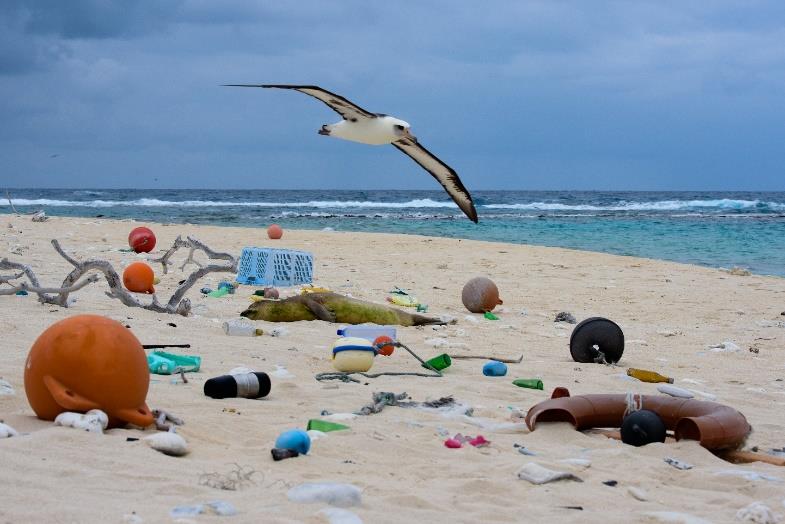Transcending Words Into Action: A Reflection On How Past Experiences Can Inspire A Plastic-Free Movement
Written by Elizabeth Linske
Georgetown University, Graduate Student Environmental Metrology and Policy

Several years ago, I first witnessed an animal perish due to plastic ingestion. As a marine scientist, I felt helpless and angered that an unnecessary piece of manmade plastic took the life of an innocent animal. It was a critically endangered Kemp’s ridley sea turtle that had ingested a balloon and ribbons. The balloon and bundle of ribbons hung from the animal’s mouth, inhibiting its ability to eat, then extended through the animal’s body, through the digestive track, and out its cloaca. This sea turtle was clearly in severe discomfort. Unfortunately, there was little we could do. Overnight, the sea turtle died.
Seeing this animal perish from plastic immediately opened my eyes to the world of plastic in which I was drowning. Everywhere I looked I saw plastic cups, plastic straws, and plastic bottles. Trash cans were overflowing with plastic, plastic bags were stuck in trees, and plastic foam pieces littered the highways. I realized that all this plastic will end up in our oceans. I realized that all this plastic may contribute to the death of other innocent marine animals, just like that sea turtle.
My mission to mitigate the plastic pollution crisis had officially begun.
This battle against plastic led me to Oceana, a non-profit organization focused solely on ocean protection and advocacy. I have been fortunate to be a part of Oceana’s Plastic Campaign team for the past year, helping develop, research, and write the national report on plastic, Choked, Strangled, Drowned: The Plastics Crisis Unfolding in Our Oceans. This report highlights the devastating impacts plastic is having on marine animals, specifically marine mammals and sea turtles, and helps educate about the plastic pollution crisis.
The extent of plastic pollution in the enormity of our oceans is largely unknown. We need a greater understanding of this field. We need to understand how much plastic is in our oceans, how plastic breaks down in the ocean, and how plastic interacts with the overall ecosystem. What we do know is that there is already too much plastic in our seas. Scientists estimate about 15 million tons of plastic enter the ocean every year. That is two garbage trucks worth of plastic being dumped into the ocean every minute. The sad reality is that this number will continue to increase unless we all make drastic changes.
Each item within that 15 million tons of plastic entering our oceans every year has the potential to do harm to one individual animal. As this report lays out, the 1,800 animals we found that had been impacted by plastic provide only a small snapshot of the issue. The number of animals being affected by plastic is much larger and will only grow if nothing is done to mitigate plastic production and use.
It just takes one person to start a movement.
Plastic pollution needs to be stopped at an industry level and an individual level. We need to push industry for less plastic to be produced and for more options that are plastic free. We cannot make change unless plastic is reduced at the source. While this will take time, individuals can take action today.
It just takes one person to start a movement. Everyone can start their own individual movement which may lead to a larger movement. This report will hopefully move people to stop and think before they go for the plastic bag or the plastic iced coffee cup. These throw-away plastic items are an easy, convenient option. However, there is no easy solution out of the plastic crisis. We must change our behaviors and actions in order to save our oceans, to save our planet.
I learned the importance of language.
This report outlined the importance of language to me. This is not a technical paper; it is an educational tool to help all understand what plastic is doing to our oceans. It highlights what is happening yet isn’t typically seen by the wider public. I had never written this way before and it broadened my scope of how to educate and write appropriately.
The importance of language cannot be understated. I had to take a step back from my science background and push myself to reword familiar concepts into words that anyone can appreciate, into words that anyone can visualize, and into words that anyone can feel.
Your actions determine a plastic-free future.
I hope that readers of the Oceana report take what they feel and transcend that into action.
As someone who worked with marine animals, an obvious human-caused death of an endangered animal is extremely impactful to me. My team and I worked incredibly hard to save an animal and then a carelessly discarded balloon caused that animal’s death. If just one person gains a sense of how actions can make a difference and save the lives of these important animals, this report will be a success.
Stop and think about your plastic choices. Stop and think about how you can make a difference.
Disclaimer: The views expressed in this piece are my own, Elizabeth Linske, and do not reflect the opinions of Oceana.
